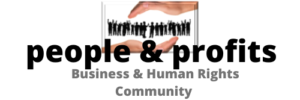News
Enhanced due diligence for conflict prevention:
Integrating BHR, international humanitarian law, and peacebuilding
(Part 1 of a series)
Voltaire Veneracion
21 April 2021

Meanwhile, a military junta in Myanmar was leading the torture and shooting of protesters after the former detained the country’s recently elected government officials. Prominent brands operating in Myanmar, including Coca-Cola, H&M and Unilever, had already voiced their concern in February over the country’s shrinking democratic space and desire to respect human rights amidst the violence.
In places such Mozambique and Myanmar where actual threats or heightened risks of violence and conflict exist, what practical measures could businesses take to respect human rights?
This was the question that UNDP Development Dialogues posed to expert speakers in its 8 April 2021 virtual forum, “Business, human rights and conflict-affected regions: towards heightened action.”
The dialogue’s speakers included:
- Asako Okai, Director, Crisis Bureau, UNDP
- Anita Ramasastry, UN Working Group on Business and Human Rights
- Abiodun Baiyewu, Executive Director, Global Rights
- Ron Popper, CEO, Global Business Initiative on Human Rights
- Marzuki Darusman, Chair, Foundation for International Human Rights Reporting Standards
- Marc Banzet, Director, Natural Resources and Governance Division, Global Affairs Canada.
Katy Thompson, Head, Rule of Law, Security and Human Rights Team, UNDP, served as moderator of the one-and-a-half-hour interactive conversation with around 400 participants joining virtually from around the world.
Start a movement

As part of its mission of promoting the UNGPs on BHR, the UN Working Group on BHR launched a project in 2018 to clarify the practical steps that States and businesses should take to implement the UNGPs in conflict and post-conflict situations and thereby prevent and address business-related human rights violations.
While the worst forms of business-related rights abuses have been committed during conflict – as documented by many researchers, human rights defenders and journalists – the private sector and the public have been in the dark on what feasible steps actors from different sectors – especially businesses – caught in such situations could take to stop them.
This 2021 virtual forum sought to bridge this gap by exploring interlinkages between Sustainable Development Goals (SDGs) on peace and security, BHR, and conflict prevention, with a focus on integrating policies and strategies on these traditionally separate fields across the UN system.
Seek advice, influence policy

After discussing examples of conflicts in Mozambique and Myanmar, Asako Okai – also UN Assistant Secretary-General (ASG) – shared key messages from UNDP’s “Prevention in Action – Global Forum 2021” (Prevention Forum), a two-day virtual event held last 3 to 4 March 2021.
The Prevention Forum examined the relationship between development, conflict prevention and peacebuilding.
UN partners, development cooperation actors, think tanks and civil society organizations reflected on the international community’s challenges and failures, lessons learned and good practices, as well as aspirations and opportunities for synergy among those heretofore compartmentalised fields.
The Prevention Forum marked the official start of Development Dialogues: Rethinking Solutions to Crisis in the Decade of Action.
A new campaign launched by UNDP, Development Dialogues seek to highlight the most urgent actions required to support vulnerable populations in crisis-affected contexts to help them move towards sustainable development.
ASG Okai summarised the key takeaways from the Prevention Forum:
- The private sector in conflict settings need to:
- be guided toward positive actions for peace;
- utilise BHR’s “do no harm” approach;
- minimise their operations’ negative impacts by:
- conducting human rights due diligence;
- seeking out advice from actors like the UN to understand conflict dynamics and participate in conflict deescalation;
- cooperating in transitional justice processes;
- carrying out remedial measures; and
- peacefully influencing government policies, for example, to eliminate discrimination.
- UN agencies should integrate various development approaches and stop working in silos in rolling out the new Prevention Offer which emphasizes integrated solutions and early actions at scale.
- UNDP and UN Working Group on BHR will develop a practical toolkit for businesses on how to respect human rights in conflict settings.
ASG Okai also called on all stakeholders to work together through a shared forum for exchanging best practices. (To be continued in Part 2)
Listen to the entire UN conversation on how to heighten due diligence during or after violent conflict below:



